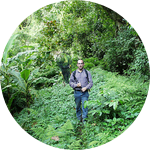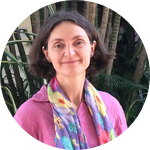About This Project
Carbon can be removed from the atmosphere and stored in peat through numerous biogeochemical processes, potentially providing a net-cooling effect. The Congo Basin's peatlands store the carbon equivalent of 20 years of fossil fuel emissions from the USA, so protecting this ecosystem is vital. We seek to explore how people, plants and birds function and interact in this ecosystem to provide insight into the state of these peatlands and inform conservation policies accordingly.
Ask the Scientists
Join The DiscussionWhat is the context of this research?
The Congo Basin peatlands are vital carbon stores, holding the equivalent of 3 years of global fossil-fuel emissions. They were first mapped in 2017, so very little is known about their ecological, botanical and human aspects. Nonetheless, they are threatened by plantations, logging concessions and climate change, potentially impacting their carbon storage, biodiversity, and local livelihoods. There is thus a real need for further research into the peatlands of the Congo Basin in order to inform future conservation efforts there, particularly given the value of this region in mitigating climate change.
What is the significance of this project?
Birds are useful indicators of environmental health, so quantifying their diversity and composition will reveal the state of these peatlands. Despite this, there is no comprehensive study of the composition of birds in the Cuvette Centrale peatlands. This project is thus the first investigation into the composition of birds in this region.
Understanding how communities use and manage flora in the peatlands will also contribute to knowledge of community-level sustainable management - a vital aspect of forest policy and governance. A plant species inventory in the peatland forest will improve our understanding of peatland vegetation and will enable the quantification of carbon stored in the forest and peat.
What are the goals of the project?
We aim to investigate the diversity and composition of bird species within the peatland forest - the first such study in this ecosystem. This will be achieved through avian point counts, whereby birds will be identified by sound and sight over 10 minute periods and at given points along a 3km transect. We seek to understand how the local community uses plants growing in peatland forest and whether resource management practices are employed by the community. With the support of translators, focus groups and interviews will be held with members of the community. Finally, along the same 3km transect, rapid surveys of plant composition every 250m and full inventories every 1km will enable us to characterise plant species growing on the peatland and terra firma.
Budget
Our research is sponsored by the Royal Geographical Society (RGS) who have awarded us a £3000 overseas fieldwork grant, but further funding is required to make our project feasible. In addition to our fundraising efforts here, we are seeking financial support from environmental organisations and through funding applications.
The field site is remote and rarely visited, so a dugout canoe and driver are required to travel to and from the peatland forests. With the support of PhD candidate, Shona Jenkins, who is researching how rural communities use peat resources, we have developed a project that will enable the collection of novel socio-environmental information. This will require a range of equipment and the support of research assistants and translators. A fee will also be paid to the local community to access their portion of the peatland forest. Without further sponsorship our ambitious project just won't be viable.
Endorsed by
 Project Timeline
Project Timeline
We will will continue planning our fieldwork during April and May and travel to the field site in June. Cassie and Joe will return to the UK on 14th July to write up our research projects. The findings of our research will be discussed in two MSc dissertations, which will be submitted to UCL in August 2022. The project will also contribute to Joseph's PhD thesis. Regular updates before, during and after the research will be posted to Joe's twitter.
Feb 01, 2022
Project launched by Joe Langley (UCL), Cassie Dummett (UCL) and Joseph Kanyama (University of Kisangani)
Mar 31, 2022
Funding awarded by the Royal Geographical Society
May 21, 2022
Project Launched
May 28, 2022
Project Launched
Jun 24, 2022
Cassie and Joe travel to the Democratic Republic of Congo and meet Joseph in Kinshasa
Meet the Team
Joe Langley
Originally from Cheshire, north-west England, I made the move down south in 2017 to undertake my bachelor's degree in Geography at the University of Exeter, UK. During my degree I undertook a six-month placement as a conservation and research assistant in Phinda Private Game Reserve, South Africa, where I learned how to undertake fieldwork effectively and safely in natural environments. My undergraduate dissertation, built on a Panthera camera-trap survey that I managed in Phinda, explored the interactions between leopards and ecotourists in the reserve. I am now studying for an MSc in Conservation at University College London and have experience using GIS and SPSS.
Though my passions are extensive, I am particularly interested in re-wilding, tropical forests and peatland ecosystems. Alongside Cassie Dummett (UCL) and Joseph Kanyama (University of Kisangani), I hope to apply my interests in the Democratic Republic of Congo in June where we will undertake an ambitious research project in the peatlands of the Congo Basin.
Cassie Dummett
I have qualitative research skills, practised during years working for Catholic Relief Services in the Republic of Congo and Democratic Republic of Congo. Currently studying for an MSc in Conservation at UCL, I am specialising in tropical forests. I am working as a freelance researcher for Forest Trends, writing dashboards on forest risk agricultural commodities and researching illegal tropical deforestation. I have managed security situations for staff deployed into emergency contexts in my job at CAFOD 2018-2020.
Joseph Kanyama
I am a PhD candidate at the University of Kisangani, where I also teach natural resource management in the Faculty of Renewable Resource Management. I have a detailed knowledge of botany in the Congo Basin forests and have applied the proposed plant inventory methodology in three other locations of the Cuvette Centrale peatlands, under the supervision of Professor Corneille Ewango. I am the co-author of a paper "Culture de Pleurotus tuber-regium (Fr.) Singer sur substrat ligno-cellulosique en République Démocratique du Congo" in Tropicultura, 2021.
Additional Information
An assessment of potential risks and ethical considerations has been submitted to UCL for approval. It is currently being signed off and a lab note illustrating approval will be posted in due course.
Project Backers
- 29Backers
- 150%Funded
- $2,405Total Donations
- $82.93Average Donation



